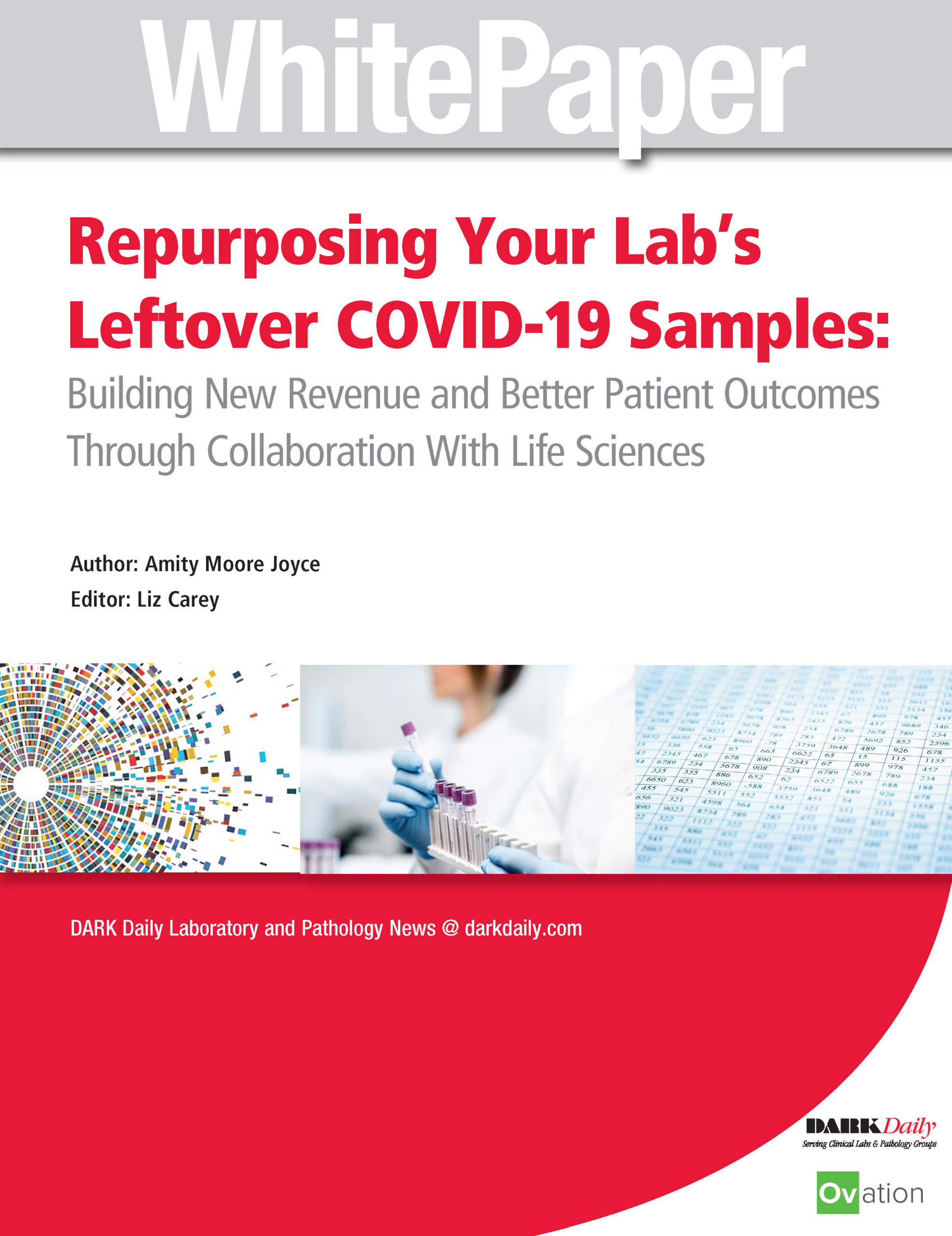
FREE WHITE PAPER | 24 Pages Published May 26, 2021
Produced in Partnership With:

The precipitous drop in COVID-19 testing leaves clinical lab leaders wondering, “What comes next?” So it’s time to pivot—again.
When the pandemic hit in March 2020, clinical labs faced a sudden halt in routine testing, and many were able to shift quickly to COVID-19 test offerings. Fast forward one year: with the COVID-19 vaccine rollout, SARS-CoV-2 testing in clinical laboratories has rapidly declined. In the United States, COVID-19 testing dropped from two million per day in January 2021 to only about one million by March.
Now labs are having to adapt again, leading forward-looking lab managers and directors to ask:
- What will be the new balance between testing for SARS-CoV-2 and routine diagnostics?
- Should my clinical laboratory even continue testing for coronavirus?
- Where is the best opportunity to generate revenue now?
- How do I transition my lab effectively—and efficiently—to best serve patients and the healthcare industry as a whole?
This white paper, Repurposing Your Lab’s Leftover COVID-19 Samples: Building New Revenue and Better Patient Outcomes Through Collaboration with Life Science, answers these questions and more. It explores how the rapid decline in SARS-CoV-2 testing affects molecular laboratories and the life sciences industry as a whole and offers opportunities for drug developers and labs to work together in new and beneficial ways.
Biospecimens present a win-win proposition for both the clinical lab and life sciences industries
As researchers on the life-science side study coronavirus and other diseases, the value of accumulated biosamples is being reevaluated. UCSF Professor Scott VandenBerg, MD, PhD, draws the connection: “Biospecimens are important because they allow researchers to better understand the causes of diseases and evaluate potential therapies.” Labs have always retained biospecimens, but COVID-19 has spotlighted their value.
Drugmakers are expected to prioritize the development of therapeutics for new patient cohorts, such as long-haul COVID-19 patients while verifying the fidelity of biomarkers used to identify and treat comorbidities. Data generated from analysis of leftover COVID-19 samples that labs can provide could dramatically accelerate this process.
This white paper examines how molecular laboratories can generate new revenue while also contributing to the greater good of society. One primary way to achieve both is to harvest more value from samples through new relationships with life science companies and biobanks. In these new business arrangements, labs would also benefit because instead of paying to dispose of their leftover COVID-19 specimens as regulated medical waste, they could biobank them at little to no cost.
Table of Contents—Chapters at a glance
This 24-page white paper, Repurposing Your Lab’s Leftover COVID-19 Samples: Building New Revenue and Better Patient Outcomes Through Collaboration with Life Sciences, includes the following main chapters:
Chapter 1: COVID-19 Testing: What’s Next After the Rapid Ramp Up and Sudden Decline?
While many labs initially lost revenue when routine testing crashed with the pandemic shutdown, the seemingly unending demand for SARS-CoV-2 testing helped labs rally as they pivoted from traditional diagnostics to COVID-19 testing. Some labs reported exceptional year-over-year revenue growth. At least 48% of clinical labs adopted new testing methodologies or automation to meet the demands of COVID volumes, and many startup and pop-up labs were launched, pointing to a significant investment in COVID testing alone. This chapter examines where we are now and what might be ahead now that COVID-19 testing is winding down.
Chapter 2: Looking Beyond COVID-19 Testing to Find Residual Value and Revenue in Collected Specimens
To stay profitable and relevant, every clinical and molecular laboratory’s short-term and long-term strategic planning must consider the evolving nature of the pandemic. This chapter covers what labs should consider as they evaluate how to repurpose their COVID-related assets, including equipment, molecular testing platforms, and COVID-19 specimens themselves.
Chapter 3: Key Points of Molecular Laboratory Diversification into Biobanking
Biobanking can be a positive thing for labs—for example, to supplement revenue, advance research, and lead to other business development in the lab services space. But it also has its challenges. This chapter discusses both the potential benefits of biobanking and the hurdles labs can face, including regulations, logistical difficulties, consent, collecting and managing samples, and building relationships with industry and research partners.
Chapter 4: The Role of LIMS in Biobanking
Questions often surround the value of a sample, such as: How was the sample collected from the patient? How was it stored? Is the label still secure? When will the sample expire and no longer be considered valuable for research? For labs trying to organize their samples and have at-a-glance answers to questions about them, a proper laboratory information management system (LIMS) or laboratory information system (LIS) streamlines the process. This chapter covers what lab managers and directors should consider as they look to strengthen their quality systems to validate and verify their samples and tests.
Produced in partnership with:

The Dark Intelligence Group is committed to protecting and respecting your privacy, and we’ll only use your personal information to administer your account and to provide the products and services you requested from us. From time to time, we would like to contact you about our products and services, as well as other content that may be of interest to you. In exchange for providing this free content, we may share your information with the companies whose content you choose to view. By accessing the white paper, you’re agreeing to the above.
You can unsubscribe from these communications at any time. For more information on how to unsubscribe, our privacy practices, and how we are committed to protecting and respecting your privacy, please review our Privacy Policy.



